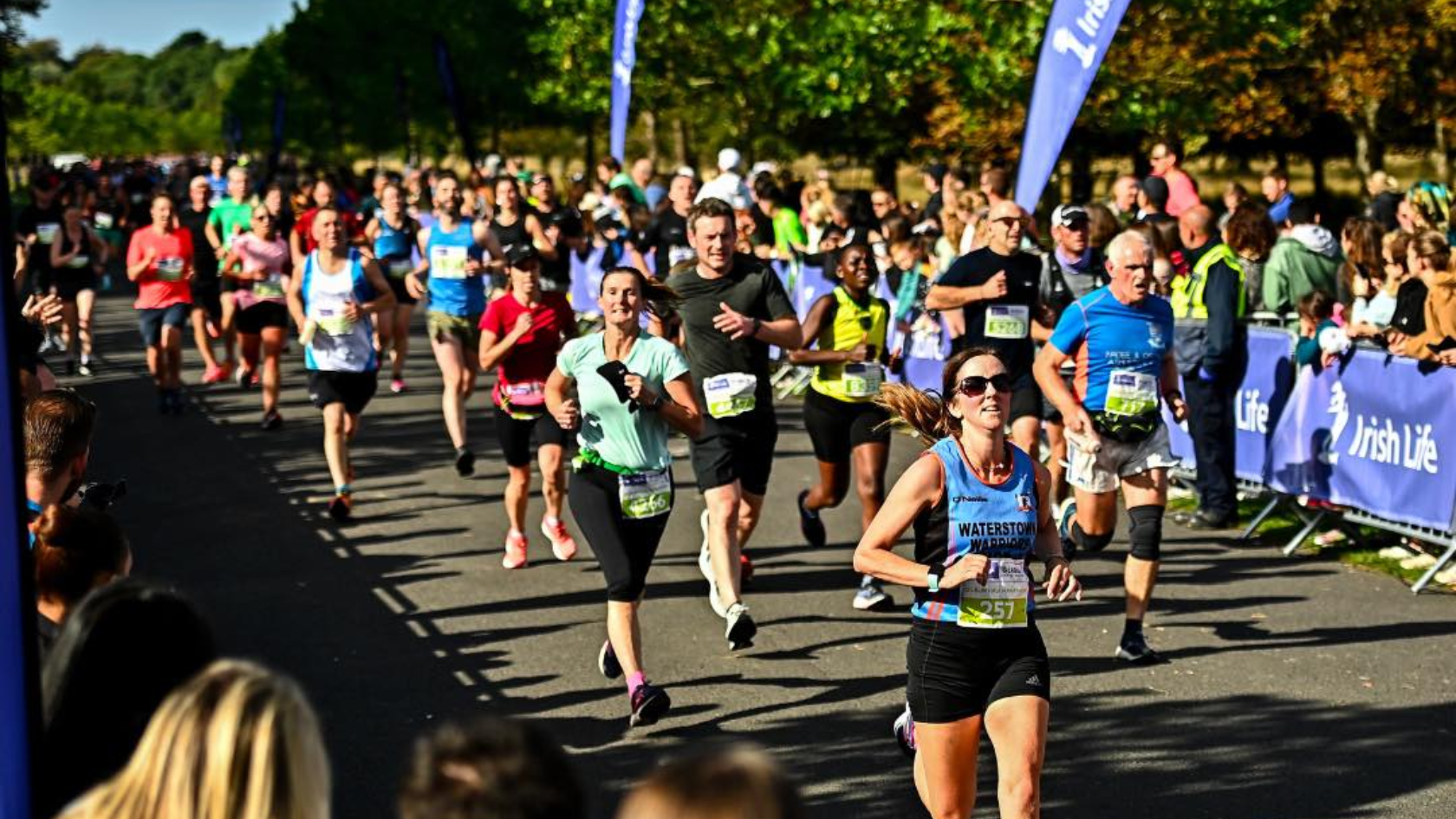Marathons
Conquering Marathon Anxiety: Tips for a Calm and Confident Dublin Race Day

“It’s all in your head... well, mostly. And also in your legs.”
Here we are, marathon hopefuls. With just four weeks to go until the Dublin Marathon, you've clocked up the miles, begrudgingly embraced the foam roller, and managed to balance strength training without transforming into the next Mr. Olympia. You've even fine-tuned a race pace strategy that doesn’t involve simply sprinting and hoping for the best. But now, just when you thought the hard part was behind you, there’s one thing left you can’t outrun: pre-race nerves.
That creeping feeling of anxiety that begins to settle in as race day looms, making you question everything from your ability to run 26.2 miles to whether you’ve set your alarm clock properly. But DON’T worry, this is all perfectly normal. In fact, if you’re not feeling a bit nervous, I’d start to question whether you’re actually running a marathon or just wandered into the wrong event.
So, how do you get that mind of yours to stop running rings around itself and start working with you instead of against you? Let’s dig into some strategies to keep your pre-race nerves in check and ensure you arrive at the start line ready to conquer.
Managing Race-Day Anxiety
Let’s be honest: the night before a marathon can feel a bit like Christmas Eve, only Santa is delivering 26.2 miles of potential agony instead of a BMX and a Playstation. The excitement, the anticipation, and yes, the nerves, all bundled together in one sleepless package.
But the good news is that pre-race anxiety can actually be helpful. A little bit of nerves means your body’s gearing up for the challenge ahead, getting you sharp and ready. The key is not to let it spiral into full-blown panic mode, which pairs about as well with running shoes as tequila shots before your driving test.
Here are a few tricks to manage those jitters:
- Stick to Routine: You’ve been practising your pre-run routine for months. Don’t change it now. Whether it’s eating that exact same questionable breakfast, listening to your 2004 Gigi D’Agostino playlist, or tying your laces in a method only you understand, stick to what’s familiar. Your brain loves a good routine, and the more you stick to it, the less likely you are to have an existential crisis at the start line.
- Control What You Can: There will always be stuff you can’t control on race day (like the weather, the crowds, or the guy who insists on running two inches beside you despite having acres of space). So focus on what you can control: your gear, your nutrition, your pacing plan and making sure you’ve not put your race bib on upside down. By taking charge of these things, you’ll feel more prepared and less likely to stress over the unknowns.
- Breathe: I know what you’re thinking: Well duh captain obvious! But really, taking a few deep breaths can work wonders for calming down those pre-race butterflies. Try a quick breathing exercise: inhale for four counts, hold for four, exhale for four. Repeat a few times and you’ll trick your body into thinking it’s in a Buddhist temple on top of the Himalayas, even if in reality still a bit of a mess.
The Power of Positive Self-Talk and Visualisation
Ah, the good old “pep talk.” We all know someone (there’s always one) who loves to shout those cringe motivational clichés like, “You got this!” and “Pain is temporary, glory is forever!” (usually about five miles too early, just when you’re contemplating faking an injury). But, it turns out, giving yourself a pep talk isn’t just the domain of insufferable influencers. It’s actually quite effective, just as long as it’s coming from you.
Positive self-talk isn’t just fluff; it’s scientifically proven to help performance. By consciously focusing on encouraging thoughts, you’ll reduce anxiety, boost your confidence, and quieten that annoying inner David Byrne voice that likes to pop up around mile 18 saying, “Well, how did I get here??”
So, how do you talk yourself into a good race?
- Turn Negatives into Positives: Instead of, “I’m going to die a slow and painful death out here,” try, “I’ve done the training, and I’m ready.” And if that still feels a bit too far-fetched, how about, “I might die out there, but at least I’ll look good doing it.”
- Create a Mantra: You don’t need to go full zen master, but having a short, repeatable phrase to focus on when things get tough can be a game changer. Something like, “Strong and steady,” or “One mile at a time.” Keep it simple and positive, trust me, it works better than berating yourself for signing up.
- Visualisation: Take a few minutes each day leading up to the race to visualise yourself on race day. Picture the start, the middle, and most importantly, the finish line. Imagine how you’ll feel strong, proud, and probably very relieved. By rehearsing these moments in your mind, you’ll help calm pre-race nerves and build confidence. Plus, when race day actually arrives, it’ll feel like you’ve been there before because, in a way, you have.
The Importance of Sleep and Relaxation During the Taper Phase
Welcome to the marathon taper, where paranoia meets recovery. For those unfamiliar with the term, the taper is the magical (and sometimes maddening) period in the weeks leading up to the race when you reduce your mileage and intensity to allow your body to recover (more on that in a later article).
The taper phase can be a mental minefield. You’ve spent months running your socks off, and now, just as race day approaches, you’re being told to ease up. Cue the panic: “Will I lose fitness? Am I doing enough? Should I go for one more long run, just in case?”
News flash: no. Trust the process. The taper is designed to help you arrive at race day feeling fresh and ready, not burnt out. And one of the most important parts of the taper? Sleep.
- Sleep Like a Champion: Getting plenty of rest during the taper is crucial. Your body needs time to repair itself from all those miles you’ve logged, and sleep is where the magic happens. Aim for 7-9 hours a night (yes, really), and try to keep your pre-sleep routine consistent. No instagram reel scrolling the night before the race, no matter how tempting it is.
- Embrace the Rest: Don’t mistake tapering for skiving off. Your reduced mileage isn’t a license to lounge around, but neither is it time to start a new Crosfit regime. Light, easy runs are fine, just don’t overdo it. If you’re feeling restless, use the time to focus on mental preparation, visualisation, and, you know, making sure you’ve packed your race kit.
- Relax, You’ve Got This: Finally, the most important tapering advice: relax. You’ve put in the hard work, and the taper is your reward. Treat yourself to a bath, catch up on some sleep, and enjoy the fact that you’re no longer a slave to your running schedule. This is the calm before the (literal) storm, so make the most of it.
Conclusion
With four weeks until the Dublin Marathon, pre-race nerves are as much a part of the experience as running gels and chafing. But with the right mindset, you can turn that anxiety into excitement and harness it to fuel your race. Remember: stick to your routine, breathe deeply, and sprinkle in some positive self-talk (or full on hype speeches, if that’s your style).
And don’t forget, this is supposed to be fun. Yes, it’s hard, and yes, it’s a bit mad to voluntarily run 26.2 miles. But you’ve trained for this, and when you cross that finish line, every mile, every long run, and yes, even every moment of anxiety will have been worth it.
So as you taper, sleep well, visualise your success, and above all, remember: you’re ready. Your legs have done the miles, your mind is prepared, and that pint of Guinness at the end is basically a guarantee.
Here’s to a strong mind, steady nerves, and the finish line that awaits you. Sláinte!

2026 Dublin Marathon Races Series Now Open for Entries

Rest Days Aren’t Optional, Here’s Why

How to Irish Athletes in Action in Spain this Evening

Everything You Need To Know About The Frank Duffy 10 Mile

How to Watch Irish Athletes in Action in France this Evening

My Hair Transplant & Running II: I Didn't for a Year and It Was Kind of My Own Fault
